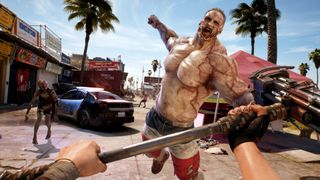
It's all too easy to compare the continued existence of Dead Island 2 to the zombies it features. Lurching on for years, long after it seemed dead, passed from one studio to another. In spite of the name, though, Dead Island 2 is practically a new game. According to game director David Stenton, when development was taken over by Dambuster in 2018 it was "built from scratch". The only thing it kept was zombies and its LA setting. "That serves the "paradise gone to hell" pillar," he says. Though the genre in which it sits feels like it never dies, with zombie games still releasing on the regular. What does something like Dead Island 2 bring to the table? What even is the identity of this series?
Speaking to Stenton and creative director James Worrall, and playing a 20-minute demo, it's clear the focus is squarely on its gnarly close quarters combat. "It was the passion for the gore, the passion for up close melee combat," Stenton explains. "And just doing that really, really well." The section of the game I played sent me to the Santa Monica Pier as Amy, one of six playable characters. It's a tight, linear portion in which the bright lights and amusements rides are slowly brought back on as I delve deeper, which makes for a poor showcase of how the game's ambitions as an open world will fare, but a good showing for the game's moment to moment fighting.
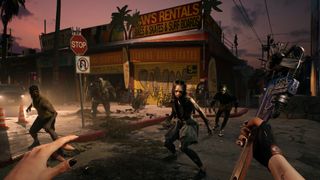
It's a spooky section, more atmospheric and subdued than the bombastic trailer might have you believe. A faint mist hangs over the city's too-damn-quiet beach, letting the red Ferris wheel blaze away in the night with real foreboding. It's a very handsome looking game. "It's easy for us to build a place that people can feel is familiar," Worrall says of the game's setting. "That then gives us that contrast with the zombpocalypse. It also means, they know wherever they go. Even if they've never been to Bel-air before, they know what Bel-air looks like." The tone in Dead Island 2 lands somewhere close to Sam Raimi's Evil Dead series. Scary things are scary or at least grotesque, while our heroes are a little larger than life, confronting horror with bravado and one-liners. Amy kept shouting and swearing at zombies, goading them the way I often find myself doing.
Personality contest
While Worrall explains there is no branching narrative, the character you choose will bring their own perspective. "Each player character has their own voice and their own dialogue. So you might get one character who's particularly driven or energised or upbeat. You might get another character who's a little bit more of a cynical individual. Some characters are quite low key, subtle. We've written those characters to reflect broad playstyles." These heroes all come with their own starting stats and abilities, but you'll be able to mould any of them more or less to your preferred style of zombie killing, so the choice largely comes down to personality.
Your player character is far from an invulnerable hero, and all the quips in the world do little once the undead shuffle onto the scene. There's a real sense of claustrophobia as zombies gather around you, since they can't be taken care of swiftly. Each individual walking corpse is a threat in its own right. In these moments the game conjures up memories of Resident Evil 4, making split second decisions about how to handle a group of foes. Take out a leg here, try for a headshot there. Except instead of guns, you're mostly wielding over-the-top melee weapons, wrestling them back as they get stuck or embedded in rotting flesh.
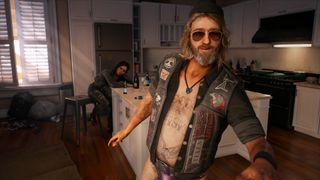
All that is thanks to a system for rendering zombie bodies called F.L.E.S.H., or Fully Locational Evisceration System for Humanoids. It took a decade to create the perfect acronym but by god, they've done it. What it means is that much like the recent Resident Evil Remakes, zombies have an absolutely disgusting level of detail as you hack or shoot at them. It's gross and grimy, the kind of excess that makes you feel like you need a shower after playing.
Perversely, I couldn't get enough. I'm a sucker for these intimate fights and Dead Island 2 has more in common with games like Chivalry than it does other zombie slayers. Dying Light might be a close cousin, but even it focuses more on acrobatics than the precision Dead Island 2 goes for. You have more than just a heavy and light attack to use, and your defensive and special attacks can be swapped out if, say, you'd rather have a block than a dash. There's lots of swapping out items (mostly cards that augment your character) for stats, but that feels considerably less exciting. It's not earth shattering—it's just done really well and the focus on precision, actually having to aim your pokes and swings to hit specific body parts, sets it apart.
The biggest gaming news, reviews and hardware deals
Keep up to date with the most important stories and the best deals, as picked by the PC Gamer team.
Hazard warning
Dead Island 2 heightens the chaos of these skirmishes with loads of interactive scenery. Sure, there's your typical explosive tanks, but the game also has a fluid simulation for water and fuel. The interplay of elements is simple enough. Water conducts electricity, fuel spreads fire—you get the idea. It feels more dynamic than simply remembering to bring the right resources to every fight. Having an electrified zombie wander into a crowded fight created a moment of panic until inspiration struck and throwing some water at their feet turned them into a weapon against all their surrounding buddies. "Ultimately, when you're the full on zombie slayer later in the game, what you're really relying on, to some degree, it's sort of a combat symphony,” says Stenton.
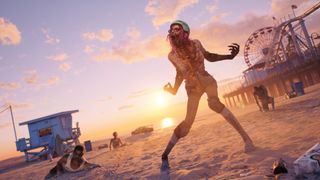
The demo ended with a boss encounter—a confrontation with a zombie clown who'd been taunting me as I explored the pier. In a fight like this, one-on-one, it transforms from a zombie game into a more well-worn action RPG. There are phases and windows of opportunity as the clown's arms can block ranged attacks. It highlights the combat's complexity, as well as its surprising difficulty. You have a lot of moves and abilities at your disposal, from a ground slam (an ultimate ability that can be traded for others, though I didn’t get to see any alternatives in the demo) to kicks and dodges, all strung together into combos. It just comes at the expense of the situational complexity of fending off a crowd of brain eaters, making it feel a lot less—and I appreciate the irony here—alive.
The presence of friends will probably help, and you'll be able to bring two along with you. Dambuster isn't giving much away about the 3-player co-op yet, but it's not hard to imagine how it could come together, with players specialising in different roles and abilities, emphasising the RPG aspect and allowing for tuning diverse builds. With some pals in the mix, I think Dead Island 2 could be a perfect game for those late night sessions.
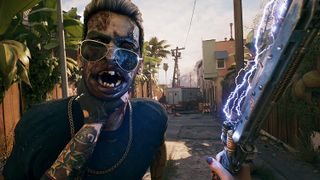
Dead Island 2 is far from novel and any hope of twists or a compelling narrative lay beyond the scope of the demo, but still, there's certainly something intriguing in it. It presents the zombie apocalypse as something its characters are forced to live with. Its heroes are immune but infected, carrying the disease without turning into zombies themselves. Meaning leaving quarantined LA isn't an option. Unable to escape, our heroes are chasing momentary joys in a bleak, broken world as they fight for their lives. That might be a bit relatable to a bunch of people right now.
I had little to no expectations or even much interest in Dead Island 2. A sequel to a mediocre RPG? Yet another zombie game? While it absolutely lacks originality, it excels in some of its execution. There's no knowing if it has an enthralling campaign to tie it all together, but in its fights the game kills. For the great combat, it's worth keeping an eye on this unexpected comeback.
Most Popular


